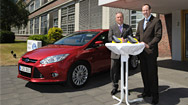Design for Lifecycle Sustainability
We use a lifecycle approach to assess and minimize the total adverse impacts of our vehicles from a sustainability perspective – from raw materials extraction through manufacturing and use to end of life. This approach considers and works to minimize negative impacts upfront in product design decisions. Called Design for Sustainability (DfS), the approach is integrated and holistic, to ensure that we achieve a balance between environmental, social and economic aspects in our product development process.
We are continuing to advance how we apply DfS principles. For example, we developed a Product Sustainability Index (PSI) tool, which has been used in our European product development operations since 2002. This tool helps us to assess and find opportunities to reduce the impacts of our products over their entire lifecycle – including environmental impacts such as global warming from greenhouse gas emissions, societal questions such as pedestrian protection and economic issues such as cost of ownership. The PSI is used by the engineering teams that are responsible for product development decisions. We use other lifecycle assessment approaches in research and sustainability departments to address general strategic questions that are not necessarily linked to individual vehicle development programs.
We are working to improve the lifecycle sustainability of our products and operations across our value chain. Among our product sustainability efforts, we are increasing our use of sustainable materials and eliminating undesirable materials such as heavy metals and substances that are known to be common allergens. We are also working to reduce greenhouse gases and other emissions from our facilities and vehicles by developing cleaner and more energy-efficient production processes, improving the efficiency of our packaging and transportation logistics and introducing cleaner and more fuel-efficient vehicles. Downstream in our value chain, we are working with drivers to educate them on ways to increase fuel economy and reduce vehicle emissions – for example, through our EcoMode and Smart Gauge® with EcoGuide driver interface technologies and our eco-driving program. Upstream, we are working with our suppliers to increase the sustainability of our products throughout the supply chain.










